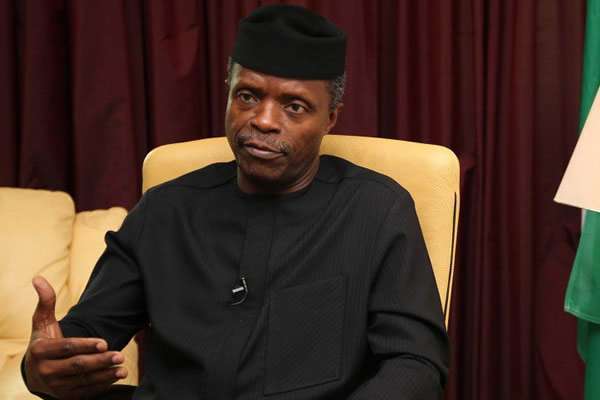Vice-President, Prof. Yemi Osinbajo, has called on other G8 and G20 countries to join in establishing public registers of the real human owners of companies in their countries to end corporate secrecy at home and among their dependencies.
Speaking at a conference on beneficial ownership organised by Extractive Industries Transparency Initiative (EITI) in Jakarta, Indonesia, Osinbajo commended United Kingdom, Norway, Netherlands and Denmark for leading the initiative.
With a global register of beneficial ownership already recording entries on about two million companies, Mr. Osinbajo said existing legislative measures must effectively discourage or totally prohibit non-disclosure agreements by governments with corporations.
He also asked countries to re-evaluate the use of secret trusts to hide beneficial ownership from the prying eyes of the law.
Nigeria, he noted, fully subscribed to EITI and the ownership transparency principles, as they not only aligned with the country’s national priorities, but also boost the electoral mandate of the present administration to fight corruption, combat insecurity and grow the economy.
Apart from being one of the first set of countries to join the EITI, and one of the 12 implementing countries to pilot beneficial ownership disclosure, he said Nigeria was also one of the few to have disclosed beneficial ownership details in three audit reports.
Besides, he said, the Nigerian Extractive Industries Transparency Initiative (NEITI) also published a comprehensive roadmap that would culminate in the establishment of the register of beneficial owners of companies operating in the country’s extractive sector.
Specifically, he said President Muhammadu Buhari, during the May 2016 London Anti-corruption Summit, made a commitment to establish a public register of the beneficial owners of all companies operating in the country.
In December 2016, the country also joined the Open Government Partnership, OGP and submitted a National Action Plan that prioritises the establishment of a public register of the beneficial owners.
Other measure adopted to reinforce the country’s commitment to the EITI, the vice president said, included presentation of a draft Money Laundering Prevention and Prohibition Bill to the National Assembly in 2016 to correct the deficiency of the 2011 Act Money Laundering (Prohibition) (Amendment) Act No. 11, 2011.
This, he explained, was to bring the law in line with the Financial Action Task Force, FATF, standards and remove the barriers to full beneficial ownership disclosure in the country.
However, the vice President decried that Nigeria is still suffering the consequences of lack of transparency in the award of OPL 245 to Malabu Oil and Gas Ltd in 1998, saying that hidden corporate ownership posed real and present danger to most countries, especially the developing ones such as Nigeria.
OPL 245 was awarded to Malabu at a time the beneficial owners were Dan Etete, then Minister of Petroleum Resources, who approved the licence, and Mohammed Abacha, son of the head of state at the time.
Ex-president Olusegun Obasanjo revoked OPL 245 in 2001 by and awarded it to Shell same year, but was revoked again in 2006 and returned to Malabu following an out-of-court settlement.
President Goodluck Jonathan finally restored the block to Malabu in 2010 in a $1.3 billion deal.
An estimate says OPL 245 holds reserves of 9.3bn barrels of crude oil and gas reserves.
But the deal has become a subject of litigation as Shell and ENI paid $1.1 billion to acquire the field from Malabu and $210 million to the federal government as signature bonus.
Both payments were made to a federal government account, leading to suspicion that Shell and ENI did not want to be directly involved with Malabu because of corporate governance issues.
Italian prosecutors believe Shell and ENI executives knew government officials were going to be bribed from the payments for their roles in getting the deal approved.
Osinbajo said: “It is important to underscore the fact that opacity in one section of the globe undermines openness in the other. We need to break down this wall together as we are all at risk of the evil effects of opacity in business ownership.
“Nigeria is still grappling with the negative consequences of the use of opacity by senior members of government and their cronies between 1993 and 1998 awarding themselves juicy contracts in the extractive industry.
“One of such incidents involving a company called Malabu Oil and Gas has been and is still subject of criminal and civil proceedings in many parts of the world involving huge legal costs while the full benefit of the natural resource remains unexploited for the benefit of the people of Nigeria to which it belongs.”
Contributing to the multi-stakeholder discussion on “tackling hidden ownership together,” Zainab Ahmed, Minister of State for Budget & National Planning, said with the country’s economy currently undergoing reinvigoration following the recent exit from recession, the country sees the beneficial ownership rule by EITI as an avenue to increase the country’s revenue earnings from taxes and attract new investments to the economy.
Kayode Fayemi, the Minister of Mines and Steel Development, reassured the conference that the review of the various laws in Nigeria to encourage the disclosure of information to the public on beneficial ownership of public assets, including anti-graft regulations and the media, were practical demonstration of Nigeria’s commitment to EITI in line with government’s fight against corruption.
Fayemi reiterated President Muhammadu Buhari’s call for the UK and other developed countries that have become safe havens for stolen resources and wealth from developing nations, like Nigeria, to give more meaning to EITI rule by facilitating the return of the stolen wealth to help develop their economies for the benefit of their citizens.
The theme of the conference, “Beneficial Ownership: Sharing Practice; Building Systems,” was inspired by the global outrage in 2016 that followed leaked confidential documents in Panama Papers data base by a consortium of investigative journalists, which implicated high-level individuals, businesses and organisations with links to the extractive sector.

